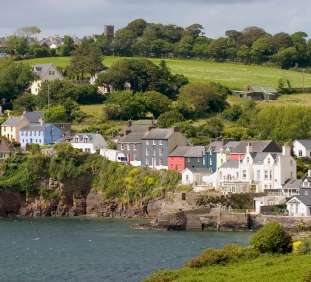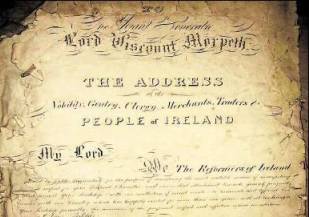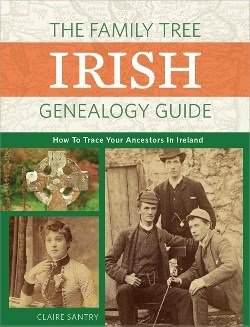- Home ›
- Irish Census ›
- Census substitutes
Ireland census substitutes
Ireland's census substitutes are a collection of surveys carried out in the 18th and 19th centuries across a localised geographical area or distinguishable group of people.
Unlike the 19th century population censuses taken by central government, a good number of these smaller-scale surveys survive. They are listed below, together with brief details and an indication of where they can be accessed.
Few are online, but the most useful are not only online, they are free to access and view.
 Kinsale, Co Cork
Kinsale, Co CorkQuick links & Related pages
Ireland census substitutes: 18th century
1708. A survey of Downpatrick in County Down. Each property in the town is listed, together with details of its size, main tenant and the six-month rent payable. A 1927 copy of this survey is held by PRONI (D 1759/2A/8.)
1740. List (names only) of Protestant householders in parts of counties Antrim, Armagh, Derry, Down, Donegal and Tyrone. Organised by county, barony and parish. Typescript copy freely available in PRONI's Search Room.
1766. The Church of Ireland instructed their
rectors to compile a snapshot view of their parishes. They were to
compile records of all householders, indicating their religion as either
Church of Ireland (Episcopalian), Roman Catholic (Papists) and
Presbyterians (Dissenters). They were also to record details of any
Catholic priests operating within the parish. Unfortunately, the
instructions did not explain how this detail was to be provided so
rectors interpreted them differently. See Ireland's 1766 Religious Census for more details.
1770. Armagh Town population census arranged by street, recording names, occupapations, family size and religion. Held at PRONI (T 808/14938 & T808/14977).
1796. Spinning wheel entitlement. More about this unlikely resource and the vital flat plant industry.
Ireland census substitutes: 19th century
1820s. Pigot's Commercial Directory. Provides
brief details of the country in alphabetical town order, and lists the
names of the local gentry, merchants and artisans by profession and
trade. Free to download at Failte Romhat.
1824-38. Tithe Applotment Books. This collection is now online, and free. Find out more about the Tithe Applotment Books.
1831-1900s. National School Registers. PRONI holds a collection of more than 1500 registers for schools in Antrim, Armagh, Derry, Down, Fermanagh and Tyrone. In the Republic, those registers that survive are usually held locally; increasingly, they are being digitised by either the local county archive or FindMyPast.
1841. The Morpeth Roll, or Testimonial Scroll. Measuring 412 metres in length, the scroll contains the signatures of some 300,000 people. Most were politicians, clergy and establishment types, but some merchants and non-nobility supporters were also thrown into the mix. Unfortunately, only some addresses or localities were noted. The Roll has been digitised by Ancestry (click image).
1841. Census Search Forms, also known (erroneously) as Irish pension records.
1846, 1856, 1870, 1881, 1894 Slater's Commercial Directory. Followed a similar format to Pigot's but expanded the number of towns and provided additional details. The 1846 version is available free on Failte Romhat.
1848-64. Griffith's Primary Valuation of Ireland.
1851. Census Search Forms, also known (erroneously) as Irish pension records.
1860s-1900s. Cancelled/Revision Books. Useful for tracking land occupation. Changes of ownership provide clues to dates of death and emigration. Books for Northern Ireland are online. Those for the Republic are held by the Valuation Office.
1876. Landowners of Ireland. This was a survey of those landowners with more than one acre. Gives name and details of the land holding of more than 32,000 owners.
Ireland census substitutes: 20th century
1939 National Register for Northern Ireland. Held by PRONI, this National Register survives intact. It is not online, nor is it available to personal visitors. Applications for information can be made via Freedom Of Information processes (not onerous).
The Family Tree Irish Genealogy Guide
Written by the creator of Irish Genealogy Toolkit and Irish Genealogy News, 'The Family Tree Irish Genealogy Guide' is full of advice, tips and strategies to ease what can be a challenging journey.
Its guidance will be useful to any researcher of Irish heritage, but especially for the target Irish-American researcher who's struggling to work back to Ireland from their immigrant ancestor.
Publisher: Penguin
ISBN: 9781440348808 / 240 pages.
 Kinsale, Co Cork
Kinsale, Co CorkIrish census substitutes: 18th century
1708. A survey of Downpatrick in County Down. Each property in the town is listed, together with details of its size, main tenant and the six-month rent payable. A 1927 copy of this survey is held by PRONI (D 1759/2A/8.)
1740. List (names only) of Protestant householders in parts of counties Antrim, Armagh, Derry, Down, Donegal and Tyrone. Organised by county, barony and parish. Typescript copy freely available in PRONI's Search Room.
1766. The Church of Ireland instructed their
rectors to compile a snapshot view of their parishes. They were to
compile records of all householders, indicating their religion as either
Church of Ireland (Episcopalian), Roman Catholic (Papists) and
Presbyterians (Dissenters). They were also to record details of any
Catholic priests operating within the parish. Unfortunately, the
instructions did not explain how this detail was to be provided so
rectors interpreted them differently. See Ireland's 1766 Religious Census for more details.
1770. Armagh Town population census arranged by street, recording names, occupapations, family size and religion. Held at PRONI (T 808/14938 & T808/14977).
1796. Spinning wheel entitlement. More about this unlikely resource and the vital flat plant industry.
Irish census substitutes: 19th century
1820s. Pigot's Commercial Directory. Provides
brief details of the country in alphabetical town order, and lists the
names of the local gentry, merchants and artisans by profession and
trade. Free to download at Failte Romhat.
1824-38. Tithe Applotment Books. This collection is now online, and free. Find out more about the Tithe Applotment Books.
1831-1900s. National School Registers. PRONI holds a collection of more than 1500 registers for schools in Antrim, Armagh, Derry, Down, Fermanagh and Tyrone. In the Republic, those registers that survive are usually held locally; increasingly, they are being digitised by either the local county archive or FindMyPast.
1841. The Morpeth Roll, or Testimonial Scroll. Measuring 412 metres in length, the scroll contains the signatures of some 300,000 people. Most were politicians, clergy and establishment types, but some merchants and non-nobility supporters were also thrown into the mix. Unfortunately, only some addresses or localities were noted. The Roll has been digitised by Ancestry (click image).
1841. Census Search Forms, also known (erroneously) as Irish pension records.
1846, 1856, 1870, 1881, 1894 Slater's Commercial Directory. Followed a similar format to Pigot's but expanded the number of towns and provided additional details. The 1846 version is available free on Failte Romhat.
1848-64. Griffith's Primary Valuation of Ireland.
1851. Census Search Forms, also known (erroneously) as Irish pension records.
1860s-1900s. Cancelled/Revision Books. Useful for tracking land occupation. Changes of ownership provide clues to dates of death and emigration. Books for Northern Ireland are online. Those for the Republic are held by the Valuation Office.
1876. Landowners of Ireland. This was a survey of those landowners with more than one acre. Gives name and details of the land holding of more than 32,000 owners.
Ireland census substitutes: 20th century
1939 National Register for Northern Ireland. Held by PRONI, this National Register survives intact. It is not online, nor is it available to personal visitors. Applications for information can be made via Freedom Of Information processes (not onerous).
Quick links & related pages


